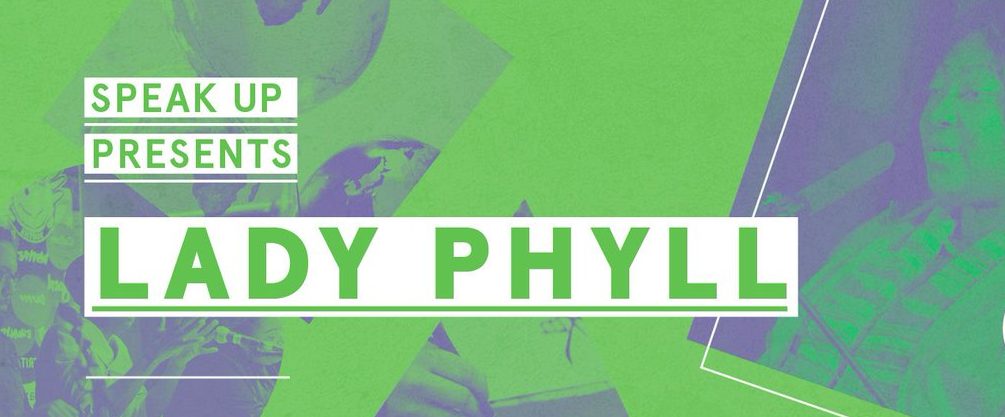Its the 30th anniversary of Black History Month, and LUU remain committed to marking the occasion with events, talks from key speakers, screenings and discussions.
On the 25th September, Society editor Lara Groves attended a talk with association from Speak Up, from queer black activist Phyll Opoku-Gyimah, otherwise known as Lady Phyll, co-founder of UK Black Pride and trustee of Stonewall, to find out about Phyll’s activism journey, intersectionality, and why we should be discussing injustice all year round, not just in October…
Phyll had a difficult journey to get to where she is today, as one of the leading activists in the UK for LGBT* rights and tackling racial injustices. She explains all the tragedies she has endured with poise, and I get the feeling they have been instrumental in her journey.
She puts forward that blackness, inherently “is political”, and that the UK and the Western worlds’ tendency to gravitate toward dangerous ethnocentrism is a serious problem for all BAME people, and “we all have a responsibility for change”. There is a tendency for momentum for black and minority issues and oppression to die down after October, so much so that we forget injustice is happening right now.

She goes on to talk about the creation of UK Black Pride, now in its twelfth year. Black Pride was “born out of a frustration”, says Phyll, that she and others like her were not “seeing ourselves in the wider Pride movement”, as there was no direct challenging of issues around structural racism. She believes UK Black Pride promotes unity and ensures there is no “erasure of voices”: BAME LGBT* people and their families have this safe, inclusive space that allows people to be both queer and black, or trans and mixed race, etc.
Phyll made headlines for turning down an MBE in 2016. A member of the audience asks her was it a difficult decision, one she had to pore over? Phyll shakes her head: she is vehement that she could not accept something that is so aligned with colonialism– “Anything that attaches itself to Empire leads a toxic legacy” she asserts. She recalls, the “venomous” backlash her decision caused both from the media and people at large (especially since she was by no means the first to do so). As Phyll speaks I am reminded of the similar abuse MP Diane Abbott received in the run up and aftermath of the 2017 General Election. Black women like Phyll and Abbott, both strong-willed advocates for change, enduring racist abuse tells us why so much more needs to be done to tackle injustice. Sitting on my chair listening to this, I become very aware of my own race; as a white woman, would I ever be subjected to the same cruelty?
“Anything that attaches itself to Empire leads a toxic legacy”
Phyll discusses the issues of so-called identity labels, and laments that “we fall into single issue politics” – for example, she found that many LGBT groups she encountered in the past did not focus enough on the differing experiences between a white queer person and a queer person of colour. Intersectionality, she explains, is paramount to her. By recognising all aspects of our own identity – queerness, blackness, disability etc – we can make the steps to moving toward intersectionality. She receives a question asking what steps a heterosexual and/or white person can do to support other groups, “to listen!” she smiles, explaining that its important to recognise difference and to be an “ally”, but “not dictate” on issues that are personal to identity.
Phyll quotes from the great Desmond Tutu: ‘If you are neutral in situations of injustice, you have chosen the side of the oppressor”, a quote that I think perfectly summarises Phyll’s stance. For this Black History Month, and beyond, its necessary for all of us to to take action in dismantling racist and homophobic structures.
How else to get involved with Black History Month:
Get in touch with…
Events:
- Pyramid Cinema Club are staging a screening of Hidden Figures, in the Pyramind Theatre in the Union, on Thursday 12th October @ 6.30pm. (£5 entry)
- Rep Your Nation, in the Pyramid Theatre in the Union, on Tuesday 10th October 7-10pm. Students from African diaspora (international and British born) are invited to celebrate BHM – feel free to bring flags and come dressed in your nation’s traditional wear
- BFS Present: An afternoon of self-care and therapy – in collaboration with the Liberation Co-ordinators, Leeds Black Feminist Society invite female students of colour to enjoy a therapeutic afternoon of gardening and colouring. Tuesday 10th October. Gardening sessions: 12-1pm, 1-2pm, Roof Garden of LUU Union. Colouring session: 12-3pm, Room 4 of LUU Union
Lara Groves

